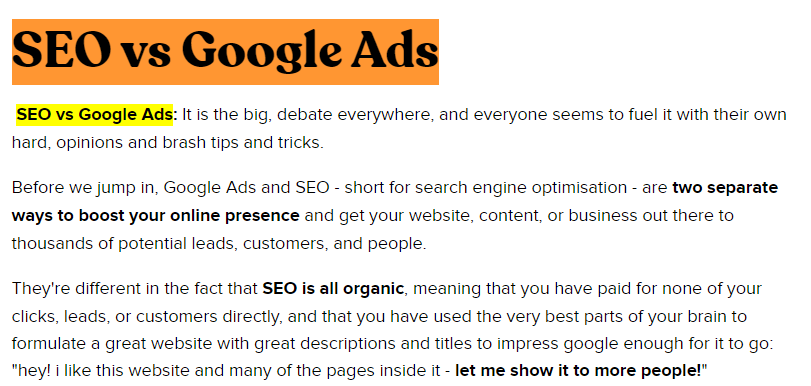
The world of online marketing is a crowded one, and everyday businesses are being bombarded with messages from different companies vying for their attention. For your business to be seen by the right people at just the right time, you need an SEO (Search Engine Optimisation) strategy that will help promote it in all areas where people might find value, commonly being search engines like Google.
You may have heard of SEO as a general digital marketing solution, but there are different avenues to explore including organic SEO and local SEO. This is why, within this article, we want to answer the question ‘What is the difference between organic and local SEO?’
What is organic SEO?
Organic SEO is the low-cost investment that creates excellent content and does not require any advertising. It involves optimizing web pages by writing high quality, highly relevant material to make it rank higher in search engine results page (SERP).
The strategy includes incorporating meta tags that represent keywords of your business or blog posts so that they can be found easily on Google when someone searches a keyword related to what you offer.
Organic SEO also incorporates backlinking through guest blogging or commenting on blogs within the industry because these links show how popular this site has been among online communities thus helping them appear more legitimate with their competitors who may have spent thousands of dollars for paid ads but ranked lower than an organic website ranking well based solely off social media shares.
Here’s some examples of Organic SEO methods:
Provide high-quality content:
In today’s digital age, content is king. Without quality content that provides a great user experience, you won’t rank as high on search engines like Google and Bing because they want to provide their users with the best possible experiences. To accomplish this, search engine algorithms need to determine the most relevant content in relation to the term the individual is searching for. To ensure that the content is quality, it should be very informative with a word count that at least matches or exceeds competitors. The content should also be completely unique and offer things that can’t be found elsewhere.
Use multiple forms of media:
To add to creating rich content for users, utilising different forms of media on your web pages enhances the usefulness of your content. People digest information differently and being able to provide several different ways of understanding that information infers that your content is much more user-friendly as it incorporates the attitudes of many different people. Providing images, videos and graphs are great examples of how you can improve a page significantly.

The image above just shows how images can complement content as well as other things like videos and tables.
Enrich pages with keywords:
One of the most well-known ways of generating organic traffic through SEO is by incorporating keywords into your content. Beginning with some keyword research, you can understand the terms that prospective customers use to find goods and services that you may provide. By mentioning these keywords on your page, you can expect your content to be more relevant to people searching those keywords.
Of course, you have to be careful not to overdo including one specific keyword too much on the page as that can have a negative effect. However, using semantic keywords related to your main keyword can help get around this and once again improve the performance of the page.

This image shows a small snippet of the use of the keyword ‘SEO vs Google Ads’ in different areas of the page.
Build links internally and externally:
Backlinks refer to the links between different web pages that are highlighted commonly through coloured text. By creating quality content, you can expect other websites to refer to your work with their own content.
Because your content is a reference point, people will usually create a backlink so it allows users to go straight to the source material, which again enhances the user experience.
Internal links work in a similar way but they are used across your own website, linking certain pages to others. One of the best examples to find this is through Wikipedia.

This small snippet above is from Wikipedia when you enter ‘search engine optimisation’. As you can see, the blue text highlights links that take you to another page on the website.
Enhance your user experience:
Everything you provide on your pages should be geared towards making the content as useful as possible to the people that are searching for it. Yes, many of the previously mentioned methods contribute to that, but there are other more obvious ways that you can accomplish this.
One thing that has become a lot more important in recent years is the readability of content. To make your content as easy as possible to see and understand is to make your user experience superior. It could be as simple as changing your font or spacing out text content better so the user doesn’t feel overwhelmed.
What is local SEO?
Local SEO is the practice of making sure your business gets found on search engines like Google and Bing, by people searching for it in their locality. The main thing that sets Local SEO apart from regular old-fashioned organic SEO is its focus on location-based searches to improve local rankings.
Google searches for these location-based terms are different than regular search queries. For instance, Google can tell the geographic location of a person by tracking their IP address so they provide results that suit your area and include local businesses you might not have been able to find otherwise.
Google uses geo-location information from people’s smartphones or computer browsers in order to determine what type of data its users want when searching online. This way, it provides certain types of content like restaurants near me which make it easier on them instead of having an entire internet full of all possible places where food could be found.
Here are some examples of Local SEO methods:
Submit your company to local directories:
One of the best methods for local SEO involves submitting your company to local directories, popular examples include Yell and Yelp. The great thing about this is that it is usually fairly easy to set up as well as being incredibly cost-efficient.
Because there are so many directories that allow you to list your business for free, you are able to be represented across many different areas without putting a dent in your marketing budget.

Above is an example of one of our listings on the free directory website Spoke.
Utilise Google my business:
Another free service that Google provides is Google my business. This is incredibly useful as it supports businesses without their own website as well. By registering on Google my business and filling it out with as much information about your business as possible, you are able to appear in search results on Google when someone searches with a location-specific term.

Here is the listings from Google My Business when you enter the keyword ‘seo essex’.
Create location-specific pages:
If you do have a website, you can create sub-pages branching off of your main services to cater towards a certain service area. Let’s say you provide a service that operates across several counties in England, you may want to create a page for each location with unique content that allows you to rank for searches related to that location.
Keep your NAP profile consistent:
A NAP (Name/Address/Phone number) profile refers to the representation of your name, address and phone number across several different digital locations. The idea behind this being a useful technique is that it bolsters your other local SEO efforts.
The important thing to strive towards is to make sure your NAP profile remains consistent, meaning that whether it be on your actual website, on a directory or on a Google my business profile, your name, address and phone number do not differ.
What should be my focus – Local or organic SEO?
To decide whether you need to utilise local SEO, organic SEO or both, you need to think about the search intent of your prospective customers. This means to decide whether they are more likely to do a local search or an organic search.
Organic search is based on relevance, links, and other factors. Organic search is the best way to reach a large audience, as evidenced by featured snippets and e-commerce stores.

After just entering ‘ppc’ as the keyword, you can see that with organic search, the results are solely driven by Google Ads results as well as organic results which you can see at the bottom of the image.
Local searches are a little different—they take into account the user’s intent when they enter their query in addition to information relevant for that area. While local searches still serve informational needs for consumers, they also contain heightened purchasing intent when it comes to products in your immediate area.

Above is an example of a local search, because a specific location has been included in the search. As a result of this, the Google map shows up with Google My Business profiles as well as ads at the top, followed by organic results below.
With this in mind, you should be able to determine what your target market is after. For example, if you are providing basic services within a specific area, it clearly wouldn’t be wise to try and rank across the country as it will be misleading to potential customers.
However, if you were in the business of selling products worldwide, you would more likely want to target general terms as opposed to localised ones so you’re not limiting your audience. Again, this is all dependent on each individual business as circumstances can always be different.
Using both Local and Organic SEO in harmony is of course the most ideal situation providing you have a large enough marketing budget.

